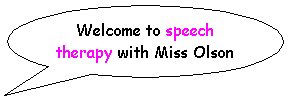

![]()


By:
Robyn Olson, Speech-Language Pathologist
*Interesting Note:
This MDU meets many needs when done in conjunction with the MDU developed
by Wendy Weber @ http://teachers.k12.sd.us/WW008
Subject Matter Emphasis:
Daily speech skills to communicate wants/needs/thoughts.
Description of this Unit:
This unit addresses the daily
communication skills needed to be able to effectively communicate their
needs/wants/thoughts. It also
addresses identification and understanding of nonverbal cues of your listener(s). Also integrated into this unit are the various other IEP
goals and objectives specifically designed for a particular student’s needs.
Goals:
![]() Communicate verbally the need/want/thought using 3-4 word utterances
Communicate verbally the need/want/thought using 3-4 word utterances
![]() Understand and utilize the listener’s nonverbal cues that they do not
understand
Understand and utilize the listener’s nonverbal cues that they do not
understand
![]() Implement the use of the augmentative communication device to make
communication intelligible
Implement the use of the augmentative communication device to make
communication intelligible
![]()
![]() Note:
This unit is specifically designed for a student with special education
needs that is currently using only 1-2 words that are nonintelligible.
Note:
This unit is specifically designed for a student with special education
needs that is currently using only 1-2 words that are nonintelligible.
Assessment:
Daily data will be collected to monitor progress made in the therapy
room, classroom and home. Daily
percentages or codes will reflect the progress toward the main goals.
A checklist is commonly used to monitor this progress daily.
Please see sample progress chart later in unit.
Content: The important
content addressed in this unit is the communication skills addressed on the IEP.
Expressive communication is the area that is most specifically targeted
in this unit, with integration of reading, math and social skills from the IEP
as well.
Learning Interests and Conceptual
Difficulties:
This particular student is very intrigued by the use of the computer and
does an excellent job at navigating the programs.
This student displays the most challenges with his expressive
communication. Utterances are short, not grammatically correct and
unstructured. Non-verbal cues are
recognized by him but not mastered according to the goal.
2-4 weeks
Objectives:
q Introduction to the augmentative communication device
q
Introduction to the nonverbal cues of the
listener
Initial introduction to the basic rules
and functions of the communication device.
![]() Turn on/off
Turn on/off
![]() Battery Plug in and charging
Battery Plug in and charging
![]() Placement in and taking out of carrying case
Placement in and taking out of carrying case
![]() General care rules
General care rules
Practice of expressing, first verbally
and then via communication device, a list of labels of 10 common objects and
sight words.
![]() Sight words worked on in the general classroom
Sight words worked on in the general classroom
![]() Flash cards to show him the words, he must read and say
Flash cards to show him the words, he must read and say
Introduction of the recognition of the
listener’s cues to not understanding the verbal utterance.
![]() I will verbally tell him that I do not understand the word that he said;
he must say it via the communication device.
I will verbally tell him that I do not understand the word that he said;
he must say it via the communication device.
2-4 months
Objectives:
q
Formulate utterances of two words in
length
q
Further use of communication device
q
Further identification of listener’s
nonverbal cues
Formulate two word utterances
![]() Practice the sight words
Practice the sight words
![]() Practice labeling colors, size or number with the object’s name
Practice labeling colors, size or number with the object’s name
![]() Introduction to the name of the ingredients for making muffins
Introduction to the name of the ingredients for making muffins
·
Oil
·
Milk
·
Egg
·
Batter
·
Muffin mix
When cued that
I do not understand him, he will use his communication device
![]() Introduction to look up screens on his device
Introduction to look up screens on his device
![]() Introduction of sentence option of device
Introduction of sentence option of device
![]() Practice typing in first and last name
Practice typing in first and last name
2-4 months
Objectives:
q Formulate utterances three words in length
q Use of communication device to form three word sentences
q Introduction to the recipe directions
Introduction to muffin recipe
![]() Practice identifying the ingredients previously trained
Practice identifying the ingredients previously trained
![]() Introduction to the objects needed to make muffins
Introduction to the objects needed to make muffins
· Spoon
· Bowl
· Tablespoon
· Muffin tin
· Muffin liners
![]() Practice of direction words
Practice of direction words
![]() Use of Power Point presentation made
Use of Power Point presentation made
Practice formulating entire sentences on the communication device before accessing the speaking of the entire sentence.
![]() Type in or select the words for the sentence
Type in or select the words for the sentence
![]() Utilize the “somewhat like” option for finding words
Utilize the “somewhat like” option for finding words
![]() Selecting the correct words in the correct sentence order
Selecting the correct words in the correct sentence order
![]() Using the sentence speak option of the communication device
Using the sentence speak option of the communication device
![]() Lesson Four~
Lesson Four~
2-4 months
Objectives:
q Recognizing and identifying the muffin ingredients
q Utilizing the communication device with an unfamiliar listener
q Recognition of non-verbal cues of listener to relay that they do not understand
Practice of muffin ingredient recognition
![]() Make a grocery list
Make a grocery list
![]() Reading off of the muffin package
Reading off of the muffin package
![]() Looking through a grocery store sales ad
Looking through a grocery store sales ad
![]() Set up a mock grocery story to practice purchasing the items
Set up a mock grocery story to practice purchasing the items
*See the Special
Education goals and objectives for math and reading (This will be
integrated in to the store activity to reinforce their learning objectives)
Practice verbal communication and nonverbal cues
![]() Ask the mock grocery store clerk for a certain muffin ingredient (this
allows a variety of students to be in the store together, each addressing their
own goals and objectives)
Ask the mock grocery store clerk for a certain muffin ingredient (this
allows a variety of students to be in the store together, each addressing their
own goals and objectives)
![]() If not understood verbally, will recognize the nonverbal cue of the
listener
If not understood verbally, will recognize the nonverbal cue of the
listener
![]() Will utilize the communication device to ask for the location of the
particular ingredient
Will utilize the communication device to ask for the location of the
particular ingredient
![]() Lesson Five~
Lesson Five~
2-4 months
Objectives:
q Combining all previously trained lessons in a variety of settings
![]() Formulate and utilize sentences of 4-5 words
Formulate and utilize sentences of 4-5 words
![]() Verbally express sentences first
Verbally express sentences first
![]() Recognize when the listener is unable to understand him
Recognize when the listener is unable to understand him
![]() Utilize the communication device to express what is not understood
verbally
Utilize the communication device to express what is not understood
verbally
![]() Trips to the local grocery store to buy the ingredients needed (again,
this involves the special education goals in reading and math)
Trips to the local grocery store to buy the ingredients needed (again,
this involves the special education goals in reading and math)
Objectives:
q
To utilize all the trained communication
skills for life skills over a lifetime.
Carryover for home and family
![]() Practice making a grocery list with Mom
Practice making a grocery list with Mom
![]() Practice finding the items on the grocery list in various stores
Practice finding the items on the grocery list in various stores
![]() Practice asking various listeners for item locations
Practice asking various listeners for item locations
![]() Integration of the reading and math skills requires him to practice
actually purchasing the items needed
Integration of the reading and math skills requires him to practice
actually purchasing the items needed
|
Objective |
Monday |
Tuesday |
Wednesday |
Thursday |
Friday |
|
Date |
|
|
|
|
|
|
Use
3-4 word phrases |
|
|
|
|
|
|
With
prompt |
|
|
|
|
|
|
Without
prompt |
|
|
|
|
|
|
|
|
|
|
|
|
|
Nonverbal
Cues of listener |
|
|
|
|
|
|
With verbal cue |
|
|
|
|
|
|
With
nonverbal cue |
|
|
|
|
|
|
Without
cue |
|
|
|
|
|
|
|
|
|
|
|
|
|
Use
of communication device |
|
|
|
|
|
|
Safety
issues |
|
|
|
|
|
|
Use
of Look up boxes |
|
|
|
|
|
|
Speak
in sentences |
|
|
|
|
|
|
|
|
|
|
|
|
|
Vocabulary |
|
|
|
|
|
|
Ingredients |
|
|
|
|
|
|
Direction
words |
|
|
|
|
|
Progress Codes:
|
Practice
Needed |
PN |
|
Emerging |
E |
|
Mastered |
M |
|
Not
addressed |
NA |
![]() Materials and
Resources:
Materials and
Resources:
Specific Augmentative Communication Device
Sight words from designed curriculum
Recipes with words and pictures
Muffin packages
Actual ingredients
Various listeners
Mock grocery store items
Empty containers
Cash register
Play money
Grocery store sale ads
Technology Resources:
ü
Digital camera for taking pictures of
actual items
ü
Augmentative communication device
ü
Computer with Internet to find different
ingredients and recipes
ü
Intellitools and Intellikeys
Standards Addressed:
All standards addressed are specifically designed to meet the needs of the individual student on the IEP. The IEP addresses goals for math, reading, OT and Speech.
 Click here to return to my web page
Click here to return to my web page